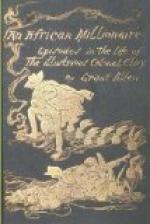He gazed around, apparently for confirmation. A lady came to his rescue.
“Wentworth was the surname of the great Earl of Strafford,” she murmured gently; “and I was wondering, as you spoke, whether Mr. Wentworth might possibly be descended from him.”
“He is,” the Seer replied instantly, with a flash of those dark eyes. And I thought this curious; for though my father always maintained the reality of the relationship, there was one link wanting to complete the pedigree. He could not make sure that the Hon. Thomas Wilbraham Wentworth was the father of Jonathan Wentworth, the Bristol horse-dealer, from whom we are descended.
“Where was I born?” Sir Charles interrupted, coming suddenly to his own case.
The Seer clapped his two hands to his forehead and held it between them, as if to prevent it from bursting. “Africa,” he said slowly, as the facts narrowed down, so to speak. “South Africa; Cape of Good Hope; Jansenville; De Witt Street. 1840.”
“By Jove, he’s correct,” Sir Charles muttered. “He seems really to do it. Still, he may have found me out. He may have known where he was coming.”
“I never gave a hint,” I answered; “till he reached the door, he didn’t even know to what hotel I was piloting him.”
The Seer stroked his chin softly. His eye appeared to me to have a furtive gleam in it. “Would you like me to tell you the number of a bank-note inclosed in an envelope?” he asked casually.
“Go out of the room,” Sir Charles said, “while I pass it round the company.”
Señor Herrera disappeared. Sir Charles passed it round cautiously, holding it all the time in his own hand, but letting his guests see the number. Then he placed it in an envelope and gummed it down firmly.
The Seer returned. His keen eyes swept the company with a comprehensive glance. He shook his shaggy mane. Then he took the envelope in his hands and gazed at it fixedly. “AF, 73549,” he answered, in a slow tone. “A Bank of England note for fifty pounds—exchanged at the Casino for gold won yesterday at Monte Carlo.”
“I see how he did that,” Sir Charles said triumphantly. “He must have changed it there himself; and then I changed it back again. In point of fact, I remember seeing a fellow with long hair loafing about. Still, it’s capital conjuring.”
“He can see through matter,” one of the ladies interposed. It was Madame Picardet. “He can see through a box.” She drew a little gold vinaigrette, such as our grandmothers used, from her dress-pocket. “What is in this?” she inquired, holding it up to him.
Señor Herrera gazed through it. “Three gold coins,” he replied, knitting his brows with the effort of seeing into the box: “one, an American five dollars; one, a French ten-franc piece; one, twenty marks, German, of the old Emperor William.”
She opened the box and passed it round. Sir Charles smiled a quiet smile.




